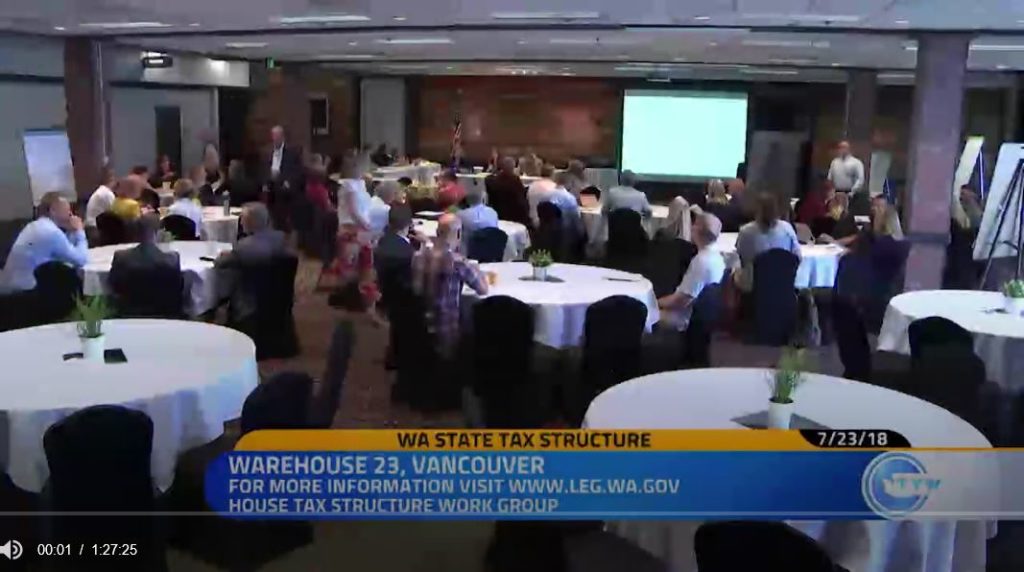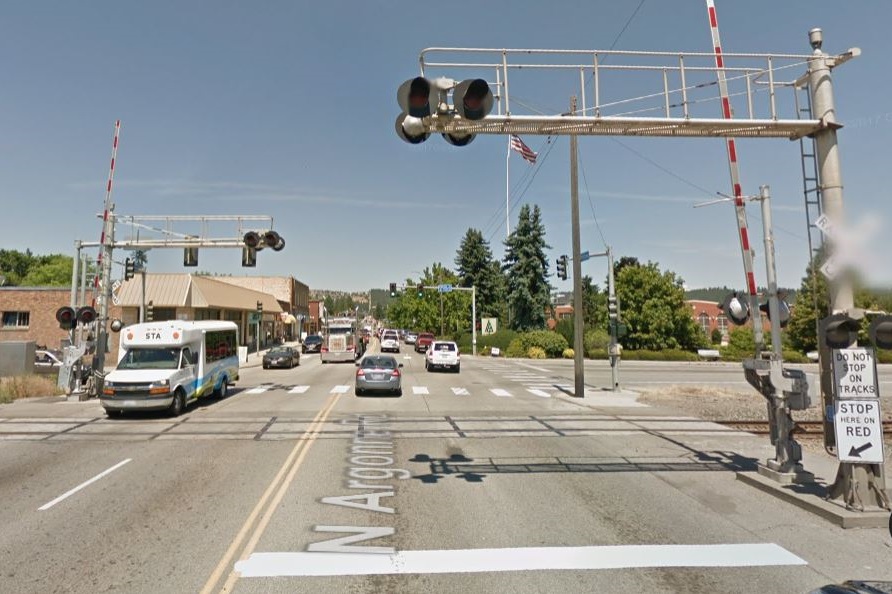The following newsletter was sent to subscribers to Sen. Padden’s Report From Olympia, July 31, 2018. To subscribe to Sen. Padden’s newsletters, click here.

Members of Liberty Lake Youth Commission appear in 4th of July parade. (Source: City of Liberty Lake.)
In heat of summer, issues simmer
Taxes, court cases, and immigration occupy attention during ‘slow season’
Dear friends and neighbors,
All of us can agree this is one of the loveliest times of the year. Sunny skies and warm temperatures make this a time for picnics, trips to the lake or beach, and backyard barbecues with friends and family. During the month of August, the world of public policy takes a little breather. We have a primary election Aug. 7, and important court decisions can be expected soon in one or more suits involving initiatives. But this is a slow season for policy matters, and things are likely to remain low-key until fall.
Even in mid-summer, though, interesting things have been happening. Read on and I’ll tell you more. And when you finish, get out there and enjoy that sunshine!
Sincerely,
Senator Mike Padden
Important court ruling expected soon
High court to decide whether I-940 will appear on ballot
We’re expecting a decision soon from the state Supreme Court on an important case that has great bearing on the people’s right of initiative. I am among the plaintiffs in a suit challenging the Legislature’s decision this year to pass and amend Initiative 940, without referring it to the ballot. This initiative, regarding the police use of deadly force, was submitted to the Legislature in a seriously flawed form, and I worked with others to craft a superior compromise. In such cases, the constitution says the original measure should be referred to the ballot along with a “legislative alternative.” Though the Legislature’s solution makes more sense than the original proposal, the majority party’s action this year denies voters a say. It makes future initiatives-to-the-legislature problematic, because the Legislature could pass and amend any measure to keep it from appearing on the ballot. Already a lower-court judge has sided with us and has ordered the original version of I-940 to the ballot. If the Supreme Court upholds the decision, it also may order the Legislature’s version to appear alongside.
Another important initiative-related dispute also may be decided in the courts. Supporters of Initiative 1639, a gun-control measure, have turned in enough signatures that the measure likely will qualify for the November ballot. The problem is that the petitions do not appear to comply with constitutional requirements for a clear and legible description of the changes that would be made to existing law. Right now this measure appears headed to the ballot, but gun-rights advocates already have fought one legal skirmish, and we can expect more litigation before the issue is resolved.
Legislators weigh in on ICE controversy
Few federal agencies have been vilified as harshly as the Immigration and Customs Enforcement agency these last several weeks. ICE is caught in the middle of a partisan debate about immigration laws, and it is under attack from members of Congress for enforcing laws that Congress passed. One member of Washington’s congressional delegation even has announced plans to introduce a bill to abolish the agency, and another has announced he will help draft it.
Many of us have been disturbed by the tone of these attacks. Common sense tells us someone needs to be responsible for enforcing immigration laws and performing other border-security functions. When political extremists liken a federal agency to the Gestapo, it breeds disrespect and raises the possibility of violence against law enforcement officials. I am among 22 Washington lawmakers last month who signed an open letter to the Department of Homeland Security, expressing opposition to efforts to abolish ICE or dramatically reduce its authority. You can read this letter here.
Just 16 years ago people of both parties supported the creation of ICE. The 9/11 terrorist attacks demonstrated the need for better coordination between federal agencies charged with border security. ICE has proved its value in combatting human trafficking, international gang activity and the entry of illegal drugs and firearms. Last year alone, ICE’s Homeland Security Investigations unit made 4,000 criminal arrests in national anti-gang operations. Special agents seized 7,000 pounds of heroin. We could spend the day reciting statistics like these.
People of good will can differ on the best way to enforce immigration laws. Certainly there is disagreement about detainment procedures at the border for those who have entered the country illegally. But it is the height of irresponsibility to call for the elimination of a vital law enforcement agency to satisfy partisan talking points. If ICE is abolished, the burden on Washington taxpayers could increase, because state government could be required to pick up additional responsibilities – we’ve asked the Department of Homeland Security to estimate how much ICE spends in Washington. Rather than attacking the 20,000 men and women of ICE, the agency’s critics might find it more fruitful to seek changes to the laws the agency must enforce. I was proud to circulate this letter for signature, and prouder still that so many lawmakers chose to take a stand.
Hear Sen. Padden on the Lars Larson Show
Two weeks ago it was my honor to appear on the Lars Larson Show to discuss our ICE letter and the importance of coordinated federal law enforcement efforts. The Lars Larson Show, broadcast from Portland, is heard on a network of stations throughout Washington, Oregon and Idaho. You can listen to this appearance here.
State’s finances on upswing
Washington’s roaring economy continues to exceed expectations. The latest report from the state Economic and Revenue Forecast Council says June tax collections exceeded forecasts by $41.4 million. That’s in addition to the $300 million increase projected by state economists last month. These fast-rising tax collections are the result of increased economic activity, rather than tax increases, and they demonstrate there is no need to raise taxes. Yet we can expect some to urge big new taxes nevertheless.
Tax talk signals big push for income tax next year

The Vancouver meeting of the House Tax Structure Work Group can be viewed on TVW here.
When people in Olympia start talking about tax reform, what they really mean is an income tax. This has been the lesson of the last 83 years, ever since Washington adopted its current tax code and said no to an income tax. Those interested in higher taxes and spending have been trying to change our mind ever since. So far these efforts have come to nothing – the people keep voting no, nine times since 1934.
This summer the majority party in the state House launched yet another tax-study panel, the House Tax Structure Work Group. This committee started holding hearings across the state this month, including a hearing in Spokane July 19. You can watch the Vancouver session here.
The opening briefings may be of interest to anyone who wants to know how Washington’s tax system works. But it doesn’t take much imagination to see where this is heading. In the past, tax-study groups like these have been used to gin up support for politically unpopular taxes, and provide cover for lawmakers who wish to push them in the Legislature.
For the last several years, an increasingly powerful faction within the majority party has been looking for new strategies to promote an income tax, over the dead-set opposition of the people of Washington. The latest idea is to promote a narrow form of income tax, a tax on capital gains income. Supporters insist it will only hurt the rich, not people like you and me. They also are trying to claim this income tax is not an income tax, contrary to logic, plain English and legal definitions at the federal level and in other states. The most-current version of this income-tax proposal is embodied in this year’s House Bill 2967.
There are many problems with this idea. Industries critical to our economic prosperity would find greater opportunity in other states. Roller-coaster revenue would create severe financial problems, and future legislatures likely would be forced to expand the tax into a general income tax affecting all taxpayers. The tax would not make things “more fair,” as advocates like to claim, but rather would give state government the means to dig deeper into people’s pockets. Let us take this new tax-study effort as a warning. It shows the income-tax crowd is getting ready for another major battle at the statehouse next year. Some people just can’t take no for an answer.
Next steps in fight against impaired driving
Last week I joined Rep. Roger Goodman, D-Kirkland, chair of the House Public Safety Committee, for a discussion about “next steps” in the effort to reduce the devastating consequences of impaired driving. You can listen to it here.
This interview, aired on KUOW radio, was a recognition of our efforts to toughen DUI laws in this state. We scored a major victory last year in making a fourth DUI conviction within 10 years a felony. But more remains to be done. Most states impose felony sentences on the third conviction, including our neighboring states of Oregon and Idaho. For now, we are focusing our attention on extending the “look-back” provision, allowing us to consider DUI convictions over a longer period of time. The issue has been forced into the spotlight by a fatal head-on collision on I-5 this month near Arlington. The wrong-way driver had six prior DUI convictions, and police say he had an open container of alcohol in his vehicle. They have booked him on a charge of vehicular homicide. If we have a longer “look-back” provision, or no time limit, irresponsible drivers would do more prison time – and we’d keep them off the road longer.
‘Friend of the court’ brief filed in lawsuit against Sound Transit
 Last year the Senate Law and Justice Committee, which I chaired, conducted an investigation into the tactics used by Sound Transit to promote its mammoth $54 billion transit ballot measure in 2016. We found the agency played fast and loose with the facts, concealed the true impact on vehicle license fees, and was not forthright with the Legislature when it sought additional taxing authority.
Last year the Senate Law and Justice Committee, which I chaired, conducted an investigation into the tactics used by Sound Transit to promote its mammoth $54 billion transit ballot measure in 2016. We found the agency played fast and loose with the facts, concealed the true impact on vehicle license fees, and was not forthright with the Legislature when it sought additional taxing authority.
A new lawsuit against Sound Transit is based on one of our findings – that the agency violated the constitution by failing to clearly state the effect of its legislation in the wording of the ballot measure. Nowhere did it mention that it planned to use a wildly-inflated vehicle-valuation schedule that was junked by the Legislature years ago after public protest. Last week I joined Sen. Steve O’Ban, R-University Place, in filing a friend-of-the-court brief in the case. In our brief, we observe that if the Pierce County Superior Court rules against Sound Transit, the agency could seek legislative approval for a fairer approach to vehicle taxation. You can read more about our argument here.
Although this case directly affects motorists and property owners in King, Pierce and Snohomish counties, it offers an important lesson for the entire state. We expect the highest standard of conduct from government, and concealment and misdirection have no place.

Argonne Road will be closed this week as the city of Millwood rebuilds the Union Pacific crossing near Euclid Avenue. (Source: Google Maps)
In the News: Argonne Road closing for rail work Tuesday
A story in Monday’s Spokesman-Review uses the closure of Argonne Road in Millwood as a jumping-off point to tell the story of the city. The community originally was known as Woodard Station, after a depot along the electric interurban railway line to Coeur d’Alene. When the city incorporated in 1927, it took the name Millwood, recognizing the importance of the Inland Empire Paper Co. mill that had been founded there in 1911. Interurban service ended in 1928, and the tracks are long gone, but as the story notes, the right-of-way remains and the city is planning a bike-and-pedestrian pathway in its place. The interurban crossed Argonne Road at a point near the present Union Pacific tracks. The city will close Argonne this week as it upgrades the UP rail crossing.
The story is a fascinating read, and it ought to satisfy anyone’s curiosity as to how Argonne Road got its name. (Here’s a hint: The Argonne Bridge was dedicated on Armistice Day 1920, and so was the Marne Bridge in Peaceful Valley.) Millwood, the first city of the Spokane Valley, remains one of the vibrant communities of the 4th Legislative District today.
Contact us!
If you have a question or concern about state government, please do not hesitate to contact our office. We are here to serve you!
Phone: (509) 921-2460
Street address: 408 N. Mullan Rd., Suite 106, Spokane Valley, WA 99206
Email address: Mike.Padden@leg.wa.gov













